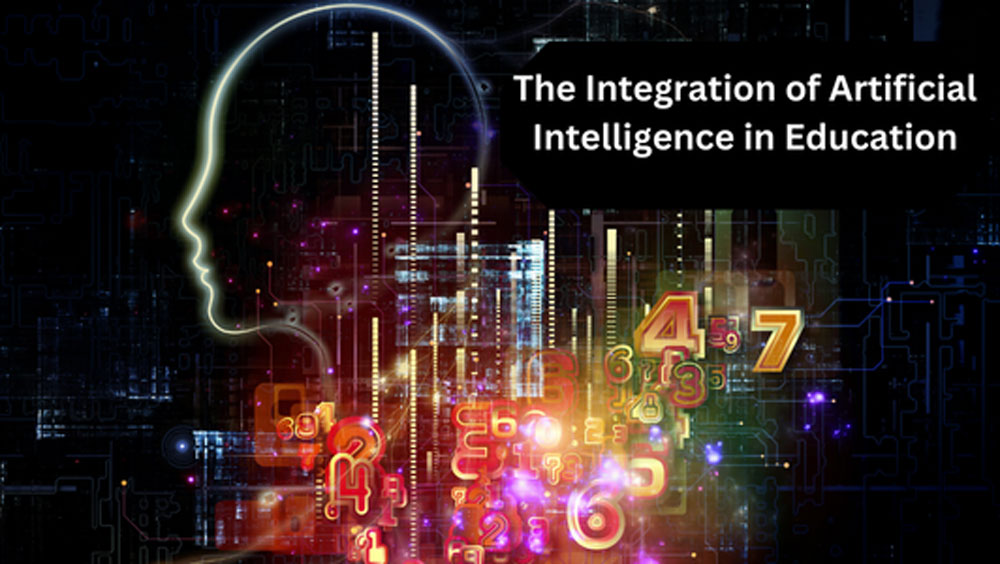Integrating Artificial Intelligence in Education: An Overview of Benefits, Challenges, and Best Practices

Incorporating Artificial Intelligence (AI) into education has the potential to revolutionize learning and teaching practices. This paper explores the benefits, challenges, and best practices associated with integrating AI into the classroom, emphasizing the need for ongoing research and development to fully harness the potential of AI in education.
AI can personalize learning experiences, providing students with tailored feedback and recommendations. This personalized approach can enhance engagement and academic performance. Additionally, integrating AI into the curriculum can deepen students’ understanding of this technology, preparing them for the digital age. Furthermore, AI can help develop critical 21st-century skills like problem-solving and collaboration through hands-on experience with AI tools.
Despite these benefits, integrating AI into the classroom comes with challenges. Teachers may lack the technical expertise needed to effectively use AI, and schools often face resource constraints when implementing AI tools. Moreover, there are ethical concerns regarding privacy, security, and the impact of AI on the job market. Teachers must be aware of these challenges and take steps to address them.
To effectively integrate AI into the classroom, teachers should partner with reliable AI providers who can offer support and guidance. Starting small and gradually incorporating AI into the curriculum allows teachers to gain experience and refine their teaching practices. It’s also important to foster ethical and critical thinking among students, encouraging them to consider the implications of AI on society.
Benefits of Incorporating AI in Education
Integrating AI into education offers several benefits, including:
Personalized Learning: AI algorithms analyze student data to tailor lessons to individual learning styles, improving engagement and academic performance.
Understanding of Technology: AI integration helps students understand complex technologies, preparing them for the digital era.
Skills Development: AI tools help students develop essential 21st-century skills, such as problem-solving, critical thinking, and collaboration, through hands-on experience.
Challenges of Incorporating AI in Education
Despite its benefits, integrating AI into education presents challenges:
Technical Expertise: Educators may require training to effectively use AI tools in the classroom.
Cost: Implementing AI can be expensive, requiring investments in technology and resources.
Ethical Concerns: AI raises ethical issues regarding data privacy, security, and its impact on job markets.
Best Practices for AI Integration in Education
To successfully integrate AI into education, educators can follow these best practices:
Partner with Reliable AI Providers: Collaborate with trustworthy AI partners to receive support and guidance.
Start Small: Begin with small-scale AI integration to gain experience and confidence before expanding.
Encourage Critical Thinking: Foster a critical perspective on AI’s ethical implications and societal impact among students.
Incorporating AI into education offers exciting opportunities for both teachers and students. By following best practices and addressing challenges, educators can harness the power of AI to enhance learning experiences and prepare students for the digital future.
Related News
Commanding Respect, Not Fear: The Modern Leader’s Approach to Team Management
Influence, vision and the capacity to lead a group of people toward shared objectives are more important components of effective leadership than…
Read MoreRedefining Education: ANC Launches Futuristic Academic Hub in the Heart of Colombo
A Bold Leap into the Future of Higher Education April 21st, 2025 – ANC Education, Sri Lanka’s pioneering private higher education provider…
Read MoreA Vision Beyond Limits: The Inspiring Educational Journey of Deshamanya Dr. Nilu Anandappa”
Dr. Nilu Anandappa In a world where education often revolves around rigid systems and exam scores, few educators rise as true pioneers…
Read MoreCSSL Announces NITC 2025: Shaping Sri Lanka’s Digital Future with Society 5.0
The Computer Society of Sri Lanka (CSSL) proudly announced the 43rd edition of the National IT Conference (NITC) 2025, the country’s premier…
Read MoreApply Now: French Embassy Research Scholarships 2025 Open for Applications
The French Embassy in Sri Lanka and the Maldives is proud to announce the opening of its annual call for applications to…
Read MoreCourses
-

IMC – Bachelor of Psychology
IMC Education Overview IMC Campus in partnership with Lincoln University College (LUC) Malaysia offers Bachelor of Psychology Degree right here in Sri… -

ANC – BA (Hons) International Business Management (Top-Up)
ANC Education Overview Designed in partnership with public and private business organizations, this program develops one’s ability to critically evaluate business models… -

IIT – BSc (Hons) Computer Science
IIT Campus Overview BSc (Hons) Computer Science provides a solid foundation and training regarding the fundamentals of the computer science field, along… -

APIIT – BSc (Hons) Cyber Security
APIIT Sri Lanka Overview Our BSc (Hons) Cyber Security award is designed to launch your future career in the protection of software… -

ICBS – BSC (Hons) Business Management with Marketing Management
ICBS Overview The BSc (Hons) Business Management with Marketing program, awarded by Queen Margaret University (QMU), is a highly regarded degree that… -

UTS – Diploma of Science
UTS College Sri Lanka Overview The Diploma of Science is designed to empower you to apply scientific thinking and analysis to important… -

CSA – Master of Architecture and Environmental Design
City School of Architecture Overview The Master of Architecture and Environmental Design Degree at CSA is awarded by the University of the… -

APIIT – BSc (Hons) International Business Management
APIIT Sri Lanka Overview Increasingly businesses are becoming more and more international. This requires business management professionals to have knowledge, skills and… -

IIT – BSc (Hons) Artificial Intelligence And Data Science
IIT Campus Overview The BSc (Hons) Artificial Intelligence and Data Science course is awarded by Robert Gordon University (RGU) in the UK… -

ICBS – International Degree Foundation in Business / IT
ICBS Overview The Scottish Qualification Authority (SQA) is a globally recognized organization dedicated to education and qualification development. SQA is responsible for… -

APIIT – BA (Hons) Finance and Business Enterprise
APIIT Sri Lanka Overview Finance and accounting are no longer just about taxation and the management of financial capital. This award will… -

APIIT – MBA General
APIIT Sri Lanka Overview The MBA is awarded by Staffordshire University, UK. This award is an advanced course of study in management… -

ANC – LLM in International Business & Commercial Law
ANC Education Overview This course is designed for graduates of law, business and finance in a legal or a corporate job role… -

AOD – BA (Hons) Fashion Design and Marketing
Academy of Design Overview The syllabus is from the UK’s Northumbria University, as one of their most revered flagship programmes and is… -

APIIT – MSc. Marketing Management
APIIT Sri Lanka Overview This MSc Marketing Management degree – awarded by Staffordshire University, UK is an advanced course of study in…
Newswire
-

Rs. 32 billion allocated for School Meal Programme – Govt
ON: April 23, 2025 -

Uncontrollable Crowd in Kandy: Military steps in, New move from Police
ON: April 23, 2025 -

Terror attack : India’s takes action against Pakistan “Leave In 48 Hours”
ON: April 23, 2025 -

WATCH : Bizarre scenes at IPL as Ishan Kishan walks
ON: April 23, 2025











